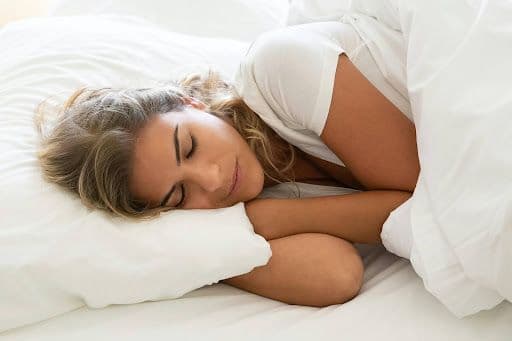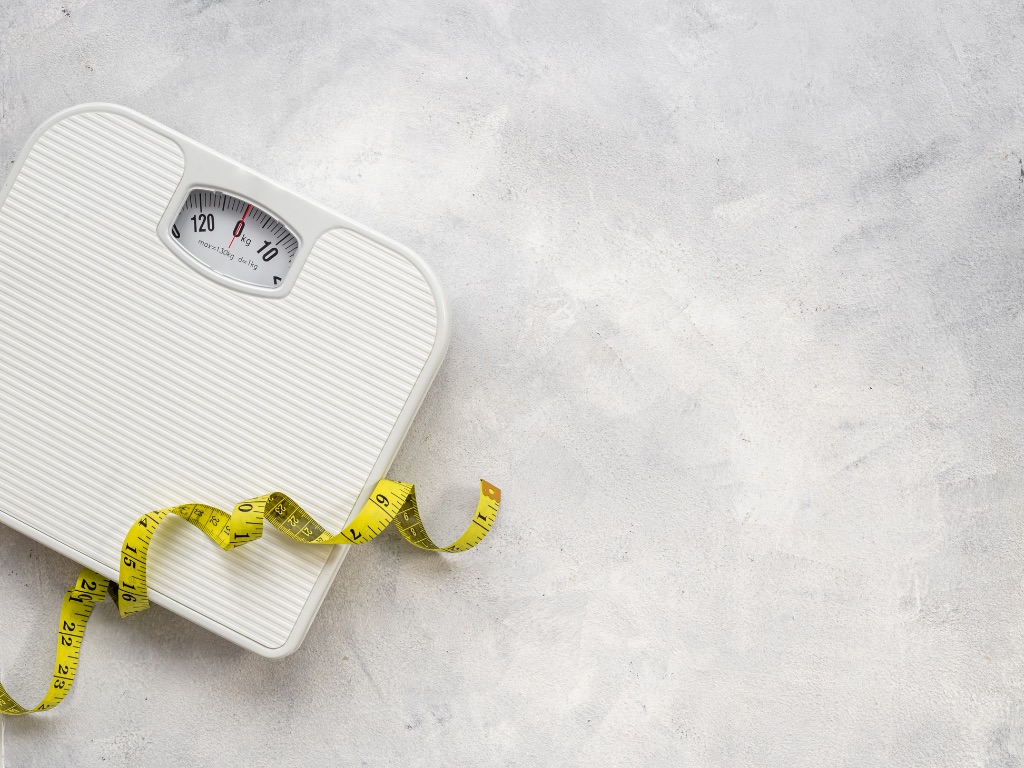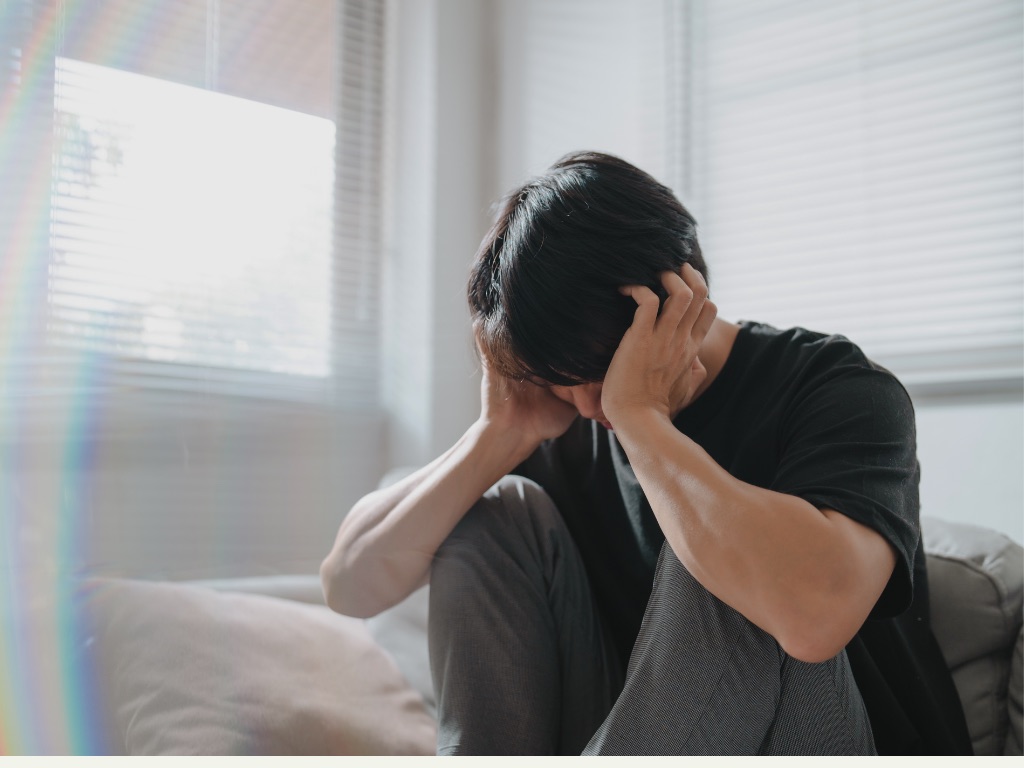Have you ever woken up in the middle of the night feeling overheated, restless, or even drenched in sweat? You’re not alone. Many people wonder: “Why do I get so hot when I sleep?” Understanding the reasons behind this nighttime overheating is the first step toward finding relief and improving your sleep quality.
At Vita Bella, we believe restful sleep is essential for overall health. From environmental factors to hormonal changes, several issues can trigger these nighttime heat waves. Our goal is to help you uncover the root causes and discover practical solutions so you can enjoy cooler, deeper, and more restorative rest. So don’t wait and get your consultation now!
Why Do I Get So Hot When I Sleep?
Your body naturally regulates temperature at night. Core temperature typically drops to promote sleep, but many factors can disrupt this balance. Research1 shows that even small temperature changes can significantly affect sleep quality.
While this natural dip in body temperature should make nights more comfortable, many factors can interfere, ranging from external elements like your bedroom environment and bedding to internal influences such as hormonal fluctuations2, stress, or underlying medical conditions. Understanding these causes can help you identify whether your overheating is a normal response or a sign of something that requires attention.
Common Causes of Sleeping Hot
1. Natural Body Temperature Fluctuations
During sleep, your circadian rhythm naturally lowers your body temperature to prepare you for rest. This cooling effect helps signal the onset of sleep and supports deeper stages of rest. However, factors like metabolic activity, heavy bedding, or non-breathable fabrics can interfere with this process, leaving you overheated.
A 2001 study confirmed3 that circadian-driven thermoregulation is important for sleep onset and maintenance. The researchers found that even small disturbances in heat dissipation, such as restricted blood flow to the skin or an inability to release excess heat, delayed sleep onset, and reduced overall sleep quality. In simple terms, if your body cannot cool itself properly, you are more likely to struggle with falling asleep, waking up during the night, or experiencing restless sleep.
2. Bedroom Environment
A bedroom that’s too warm, poorly ventilated, or furnished with heat-retaining mattresses can significantly raise your body temperature during sleep. This disrupts the body’s natural cooling cycle and leads to restlessness or frequent awakenings.
Research4 published in the Journal of Physiological Anthropology found that maintaining an optimal bedroom temperature between 19–21°C (66–70°F) supports both comfort and sleep quality. The study revealed that higher ambient temperatures delayed the onset of deep sleep stages and increased nighttime wakefulness, while cooler environments promoted stable thermoregulation and more restorative sleep cycles.
3. Bedding and Sleepwear Choices
Heavy blankets, synthetic fabrics, and non-breathable pajamas trap excess heat and moisture, worsening night sweats. Research5 by Tokura & Kishi (2006) found that sleepwear and bedding materials significantly influence thermoregulation and sleep quality.
In their controlled trials, subjects wearing breathable cotton and linen experienced lower skin humidity, reduced nighttime awakenings, and improved slow-wave sleep compared to those in synthetic fabrics. This shows that selecting lightweight, breathable materials enhances thermal comfort, reduces sweating, and supports more restorative sleep.
4. Hormonal Changes
Menopause, pregnancy, thyroid imbalances, or testosterone fluctuations can cause overheating during sleep. Hot flashes and night sweats are strongly linked to estrogen decline during menopause. Research6 published in Climacteric highlights that declining estrogen levels significantly contribute to vasomotor symptoms such as hot flashes, which directly impact sleep quality and comfort
5. Medical Conditions
Underlying health conditions are often at the root of nighttime overheating. Disorders such as hyperthyroidism, infections, autoimmune diseases, and sleep disorders like apnea can significantly affect body temperature regulation.
A cross-sectional study7 of 2,267 primary care patients found that 34% reported experiencing night sweats. Importantly, the study linked these episodes to various medical causes, suggesting that night sweats are not always benign but can indicate underlying health problems.
Key findings from the study include:
34% prevalence: Night sweats were reported by about one-third of patients, highlighting how common the symptom is.
Associated with chronic disease: Patients with sleep disorders, GERD, and thyroid imbalances were more likely to report overheating at night.
Infections: Conditions like tuberculosis and HIV are historically known to trigger persistent night sweats.
Medication side effects: Certain drugs (e.g., antidepressants or hormone therapies) were also linked to increased sweating episodes.
This evidence emphasizes that while night sweats can be caused by environmental or lifestyle factors, they should not be ignored if frequent or severe. In many cases, they may serve as an early indicator of treatable medical conditions.
6. Medications and Substances
Several medications, including antidepressants, steroids, and hormone therapies, can disrupt thermoregulation and trigger excessive sweating at night. Selective serotonin reuptake inhibitors (SSRIs) are especially associated with sleep-related sweating. A clinical review8 reported that up to 22% of patients on SSRIs experienced night sweats, showing a clear drug-related effect.
Lifestyle factors also contribute to it. Stimulants such as caffeine, vasodilators like alcohol, and spicy foods increase metabolic heat and raise the risk of overheating during sleep. When combined with medication side effects, these substances significantly increase nighttime sweating, making it essential to review both prescriptions and daily habits when addressing the issue.
7. Stress and Anxiety
Stress and anxiety directly impact the body’s thermal regulation. When the sympathetic nervous system is activated, it raises heart rate, stimulates sweat glands, and often triggers excessive sweating during sleep. This physiological arousal makes it harder for the body to maintain a stable temperature at night.
Research also supports this connection. A 2021 study in the Journal of Sleep Research9 found that individuals with chronic stress reported significantly higher rates of nocturnal sweating compared to those with lower stress levels, confirming the role of psychological stress in disrupting nighttime thermoregulation.
Practical Ways to Stay Cool at Night.
You can stay cool at night by making targeted changes to your sleep environment, clothing, and lifestyle. These adjustments directly reduce overheating, improve airflow, and help your body maintain its natural temperature balance for deeper rest. Here are simple, practical strategies you can start with:
Optimize Bedroom Temperature: Keep the room between 60–67°F (15–19°C) for the best sleep conditions.
Choose the Right Mattress and Bedding: Pick breathable options like latex, hybrid, or cooling gel mattresses, and use lightweight sheets made from cotton, linen, or bamboo.
Adjust Sleepwear: Wear loose, moisture-wicking fabrics to prevent sweat from building up.
Lifestyle Adjustments: Stay hydrated, limit alcohol or spicy foods before bed, and practice stress reduction to minimize night sweats.
Cooling Gadgets and Sleep Tech: Use cooling pillows, mattress toppers, fans, or smart climate-control devices to keep your sleep environment consistently cool.
Ready To Find Natural Support for Better Sleep & Balance With Vita Bella!
If night sweats and restless sleep are disrupting your life, adding the right supplements can make a difference. Vita Bella offers targeted medication designed to restore balance and comfort. For personalized guidance and expert solutions, you can get registered with Vita Bella health support and receive professional help tailored to your needs. By combining trusted therapies with expert advice, you can take control of your nights and wake up feeling refreshed.
Frequently Asked Questions:
Do certain positions make you sweat more at night?
Yes. Sleeping on your stomach or curling tightly into a fetal position limits airflow around your body, trapping heat and causing more sweating. In contrast, sleeping on your back or side with space for air circulation helps your body stay cooler. Using breathable bedding and a supportive pillow can further reduce overheating.
Can diet cause night sweats?
Yes. Spicy foods, caffeine, and alcohol stimulate your nervous system and widen blood vessels, which raises body temperature and triggers sweating. Eating large or heavy meals before bed can also increase metabolism, leading to nighttime heat. Adjusting your evening diet and avoiding stimulants close to bedtime often helps reduce the problem.
Is it normal to sweat every night?
Occasional night sweats are normal and often linked to a warm bedroom, stress, or food choices. However, sweating consistently every night may signal underlying health issues such as hormonal imbalances, thyroid disorders, infections, or even side effects of medications. Persistent night sweats should not be ignored, especially if they affect sleep quality. We recommend you see a medical professional or your primary care provider if you’re experiencing this frequently.
References
1- Chen HC, Chen CC, Lin FL, Chang CL. Bedroom Temperature and Sleeping Quality. In: Duffy VG, editor. Digital Human Modeling. Applications in Health, Safety, Ergonomics and Risk Management. Lecture Notes in Computer Science, vol 8529. Cham: Springer; 2014. p 204–211. DOI: 10.1007/978-3-319-07725-3_20.
2- Kim TW, Jeong JH, Hong SC. The impact of sleep and circadian disturbance on hormones and metabolism. International Journal of Endocrinology. 2015;2015:591729. DOI: 10.1155/2015/591729.
3- Baker FC, Waner JI, Vieira EF, Taylor SR, Driver HS, Mitchell D. Sleep and 24-hour body temperatures: a comparison in young men, naturally cycling women and women taking hormonal contraceptives. The Journal of Physiology. 2001 Feb 1;530 (Pt 3):565–574. DOI: 10.1111/j.1469-7793.2001.0565k.x.
4- Okamoto-Mizuno K, Mizuno K. Effects of thermal environment on sleep and circadian rhythm. Journal of Physiological Anthropology. 2012 May 31;31:14. DOI: 10.1186/1880-6805-31-14.
5- Kondo M, Tokura H, Wakamura T, Hyun K-J, Tamotsu S, Morita T, Oishi T. Physiological significance of cyclic changes in room temperature around dusk and dawn for circadian rhythms of core and skin temperature, urinary 6-hydroxymelatonin sulfate, and waking sensation just after rising. Journal of Physiological Anthropology. 2007 Jun;26(4):429-436. DOI: 10.2114/jpa2.26.429.
6- Archer DF, Sturdee DW, Baber R, de Villiers TJ, Pines A, Freedman RR, Gompel A, Hickey M, Hunter MS, Lobo RA, Lumsden MA, MacLennan AH, Maki P, Palacios S, Shah D, Villaseca P, Warren M. Menopausal hot flushes and night sweats: where are we now? Climacteric. 2011 Oct;14(5):515–528. DOI: 10.3109/13697137.2011.608596.
7- Mold JW, Mathew MK, Belgore S, DeHaven M. Prevalence of night sweats in primary care patients: an OKPRN and TAFP-Net collaborative study. Journal of Family Practice. 2002 May;51(5):452–456. DOI: 10.1016/S0022-5347(05)64863-4.
8- Thompson, S. R. (2021). Pharmacologic treatment of antidepressant-induced sexual dysfunction: A systematic review. Archives of Clinical Psychiatry (São Paulo), 48(3), 226–234. https://archivespsy.com/menu-script/index.php/ACF/article/view/226
9- Vgontzas AN, Fernandez-Mendoza J, Lenker KP, Basta M, Bixler EO, Chrousos GP. Hypothalamic-pituitary-adrenal (HPA) axis response to exogenous corticotropin-releasing hormone (CRH) is attenuated in men with chronic insomnia. Journal of Sleep Research. 2022 Jun;31(3):e13526. DOI: 10.1111/jsr.13526.





















